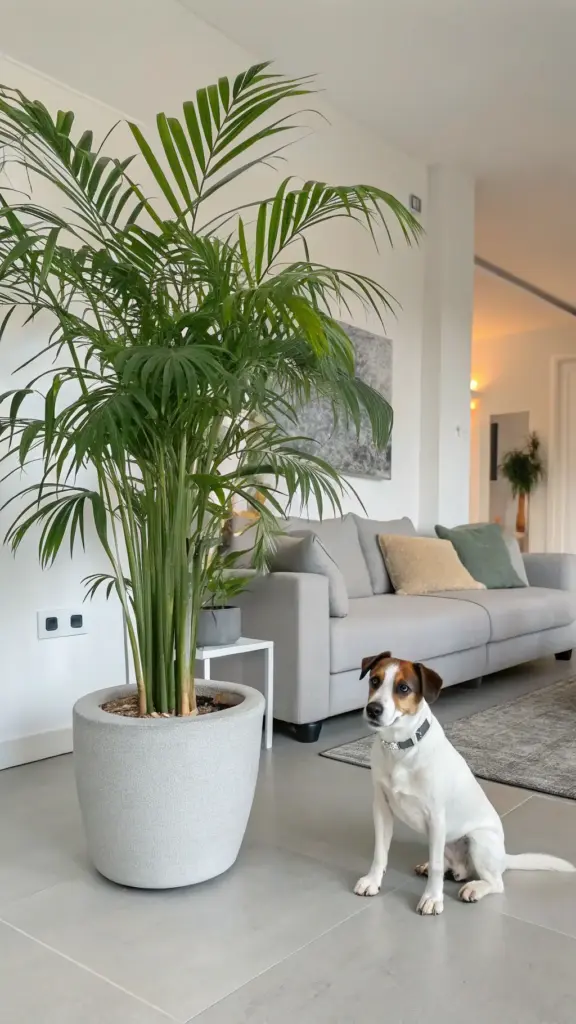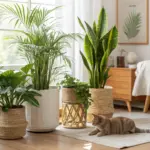7. Parlor Palm (Chamaedorea elegans) – The Elegant Air-Purifier

Let’s talk about a true classic in the world of houseplants: the Parlor Palm, or Chamaedorea elegans if you want to use its botanical name. This beauty has been gracing homes for ages, and there’s a good reason it’s stuck around as a favorite. It brings such a graceful, airy feel to a room, and bonus points – it’s pretty darn easy to care for as far as palms go!
Why the Parlor Palm is a Timeless Touch of Green Elegance
So, what makes the Parlor Palm such a standout? Well, it’s a classic, elegant palm that just exudes sophistication, but in a really understated way. It’s not flashy, but it has this lovely, delicate arching foliage that adds a soft touch of green wherever you put it. I’ve always appreciated how it can fill a space without overwhelming it.
It’s also known for being a fantastic air-purifying houseplant. While it’s not going to replace your HEPA filter, it’s nice to know it’s quietly working to make your indoor air a little cleaner. And while it’s a slow-growing plant, which is great if you don’t want something that’s going to take over your living room overnight, it can eventually reach several feet tall, becoming a really lovely specimen piece. It’s one of those beginner friendly palms that makes you feel like a plant pro.
My Simple Secrets for a Thriving Parlor Palm
When it comes to Parlor Palm care, the good news is that these palms ain’t too fussy. One of their biggest selling points is that they tolerate lower light conditions well.1 This is a game-changer if you don’t have tons of bright, sunny windows! Think about those less sunny spots in your Dallas-Ft. Worth home – a north-facing window, or a corner a bit further away from a brighter window, could be perfect. They really are excellent low-light houseplants.
For watering, they prefer consistent moisture, but you definitely want to avoid overwatering. Soggy soil is a no-go for most palms, including this one. I usually water mine when the top inch or so of soil feels dry to the touch. If the tips of the fronds start to go brown, it could be a sign of underwatering, or sometimes it means the air is too dry (they do appreciate a bit of humidity, so occasional misting doesn’t hurt, especially in winter). Yellowing fronds can often be a sign of too much water. It’s a bit of a learning curve, but they’re pretty communicative once you get to know them!
Styling Your Space with the Graceful Parlor Palm
The Parlor Palm is incredibly versatile when it comes to home decor fit. It can add a real touch of Victorian charm if that’s your style, or it can lean into a more breezy, tropical elegance. Because it can get quite tall over time, it makes a perfect floor plant in a living room or dining area. Imagine it nestled in a beautiful ceramic pot, adding a vertical element and a splash of life.
It’s also a sophisticated addition to a home office, bringing a bit of calming green to your workspace. I’ve even seen smaller ones look lovely on a sturdy side table. They just have this way of making a space feel a bit more polished and inviting. They are truly one of the best small indoor trees you can get if you’re patient with their growth.
A Tropical Getaway for Your Pets? Absolutely Safe!
And here’s the fantastic news for all of us pet parents: Parlor Palms are safe for cats and dogs! This is a huge plus, as some other popular palms can actually be toxic. With the Chamaedorea elegans, you can bring that touch of the tropics indoors without risk to your furry family members. So, if your cat enjoys a gentle pat at the swaying fronds, or your dog gives the base a curious sniff, you don’t need to worry. It’s wonderful to have such an elegant and pet-safe palm option!
The Parlor Palm truly is a graceful and forgiving plant, perfect for adding a touch of green sophistication to almost any home. Ready to meet a plant that’s all about sharing the love (and its leaves)?
Click NEXT below to explore our eighth pet-safe pick!









GIPHY App Key not set. Please check settings